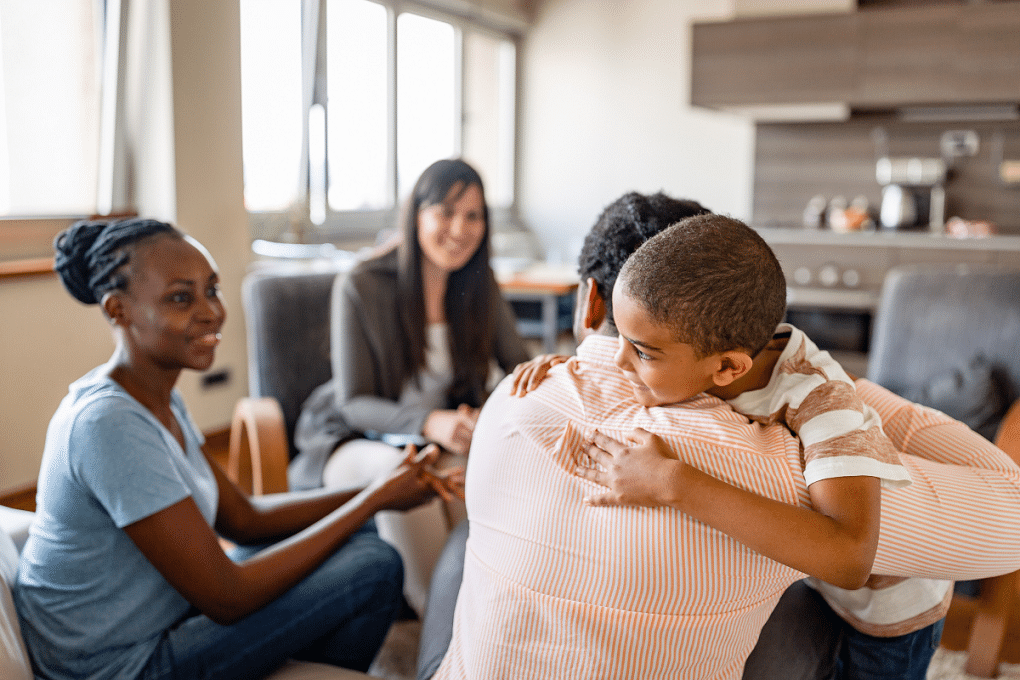Each year, National Children’s Mental Health Awareness Day, celebrated on May 7th, aims to raise awareness about the importance of positive mental health on a child’s healthy development. It’s no surprise that in a world with a global pandemic, warfare abroad, and never-ending political turmoil, every child’s mental health is of the utmost importance. Therefore, as a parent, it is crucial to have open, safe conversations with your kids about therapy and other forms of help available to them.
It’s not easy being a parent, especially in 2022. In fact, it’s very likely that if you are a parent in this day and age, you spend most of your energy wondering if you’re doing anything right. Rest assured, just showing up and being present to your kids already means you’re doing better than you think. This article will guide you through five helpful tips when sitting down and talking to your kids about therapy.
Five Helpful Tips
Meet them where they are.
The good news is therapy is becoming more and more destigmatized. It’s not uncommon to watch a T.V. show or a movie where a child is going to therapy or talking to a guidance counselor at school. Take the time to watch shows that your kids are watching. Then either set a time aside to talk with your kids about what they watched or casually bring it up on the couch when the episode ends. This way, your kids feel like they are talking more about a character rather than specifically their own issues. It’s okay to get creative when asking them to think more about what’s going on in their own lives.
Explain that a therapist is like a doctor.
Kids are familiar with going to the doctor when they don’t feel well. So, when you bring up the idea of going to a therapist, explain that it’s very similar to going to the doctor, even though not all therapists have a doctorate degree. Often therapists are seen as “feelings doctors” to younger children, and that can be a great way to articulate it. You can tell your child that there are different “doctors” for different reasons, and a therapist can be a great place to go when we feel sad, upset, or anxious.
Don’t use therapy as punishment.
If your child has started to act out or you find yourself in the middle of a fight with them where emotions are high, don’t say, “I am sending you to a therapist!” If you do, they will see therapy as a punishment rather than a service to help them. They also will likely think something is wrong with them if they must go to therapy because of something they did. You want to keep the idea of therapy as normal as possible.
Consider finding a therapist yourself.
The truth is that almost anyone can benefit from having a therapist. In older generations, therapy can seem like something you do only if something is wrong. But you don’t have to be depressed or anxious to seek out therapy. Some people just find it helpful to talk to someone about the highs and lows of life. Maybe a co-worker brings out the worst in you at the office, or perhaps you and your partner have struggled to communicate effectively lately. A therapist may be a great resource for expressing your feelings and frustrations, or even good things happening! Kids look to their parents to understand what is normal or healthy. If you see a therapist yourself, there is a good chance your kid will see it as something people do for themselves, no different than working out.
Teach your kids that therapy is an act of self-care.
Self-care is becoming rather mainstream on social media, so try teaching your kids that therapy and other healing modalities are an important part of self-care. If you teach your kids about fueling their bodies with healthy foods, adding yoga or movement to their days to take care of their bodies, and getting a good night’s sleep so they feel energized for the next day, explain that therapy is very similar. It’s how they can take care of their emotional wellness, and it’s simply another tool in their toolbox.
The more time you take to teach your kids about the benefits of therapy at a young age, the more likely they are to see it as a positive part of their lives. Explaining to your kids that life will always have lows just as well as highs will help them understand that there is nothing wrong with having emotions like sadness, anger, or frustration. And that all emotions just want to be validated and released. Therapy is a great way to learn how to release emotions so kids can be back on their way to feeling happy, excited, and grateful.
If you are looking for a therapist for yourself or your child, you can reach out to one of our mental health professionals by calling 301-345-1022 or by filling out an online referral form here.
Contact Us Today
To learn more about the services we offer at Advanced Behavioral Health, visit our services page here. Remember, it takes a village to ensure the health and wellness of your child; you are not in this alone. Let us help you and your family find the right resources for them on their wellness journeys.
